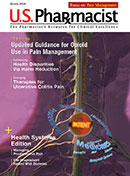US Pharm. 2016;41(1):16.
According to a new study, the risk of developing Alzheimer’s disease increased in men treated with androgen-deprivation therapy (ADT) for prostate cancer, especially in those who took testosterone-lowering medications for longer periods of time.
The analysis of medical records from two large hospital systems, published recently in the Journal of Clinical Oncology, revealed that patients using ADT were almost twice as likely to be diagnosed with Alzheimer’s disease in the years that followed, compared with those who did not undergo the therapy. In addition, the risk shot up with longer duration of treatment.
While the study does not prove that ADT increases the risk of Alzheimer’s disease, results suggest that possibility and are in line with other evidence that low levels of testosterone can weaken the aging brain’s resistance to Alzheimer’s disease, according to researchers from the University of Pennsylvania School of Medicine in Philadelphia and Stanford University School of Medicine in California.
For the study, researchers evaluated medical records from the Stanford health system and Mt. Sinai Hospital in New York, which included about five million patients, 16,888 of whom received a diagnosis of prostate cancer and met all the other criteria for the study. The 2,400 men who had received ADT and had the necessary follow-up records were matched according to age and other factors with a control group of prostate cancer patients who had not received ADT. Statistical analysis indicates that the ADT group had significantly more Alzheimer’s diagnoses in the years following initiation of that therapy, indicating that their likelihood of developing the cognitive disease was about 88% higher than the control group. The risk was doubled for patients who took ADT for longer durations, according to the results.
About half a million men in the U.S. are taking ADT at any given time to help stem the growth of prostate tumors. The treatment has a range of adverse effects, however, including impotence, obesity, diabetes, hypertension, heart disease, and depression. Recent research has linked low testosterone to cognitive deficits, pointing out that men with Alzheimer’s disease tend to have lower testosterone levels compared with men of the same age without the disease.
To comment on this article, contact rdavidson@uspharmacist.com.





